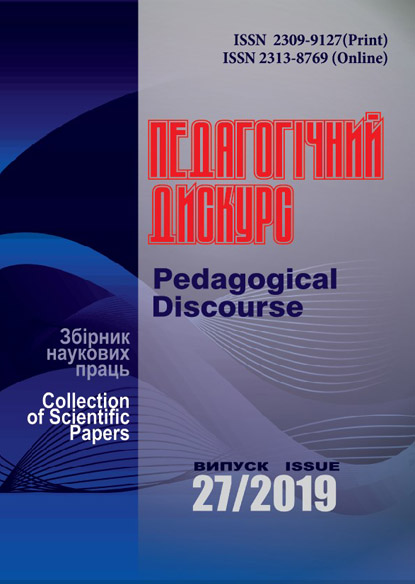The Philosophical Origins of Professional Self-Improvement of Primary School Teachers
Abstract
Based on a deep analysis of the development of the idea of self-improvement in the history of philosophical thought, the article highlights and describes an idealistic, materialistic and dialectical understanding of self-improvement of a person, presents their comparative characteristics and emphasizes their importance for the formation of a personal worldview position regarding professional self-improvement among primary school teachers.
Idealistic understanding is based on the recognition of the self-improvement of the self as a purely internal activity aimed at the development of spirituality, enriching the inner world of man by actualizing the potential strengths and capabilities. The materialistic approach characterizes self-improvement as the predominantly external activity of a person aimed at achieving the socially determined and socially conditioned ideal of mental, physical and moral perfection by correcting one’s own activity and behavior in accordance with the norms and values of a certain society for self-assertion in it. In a dialectical approach, idealistic and materialistic views on the nature of this phenomenon are harmonized on the basis of the unity of opposites and the primacy of humanistic values, whereby self-improvement of the individual is interpreted as activity aimed at both the enrichment of the inner world and the perfection of the outside world.
The author made an attempt to classify primary school teachers according to the dominant tendencies of their personal professional self-improvement into idealistic teachers, pragmatists, and harmonizers. The importance of familiarizing future primary school teachers with the above philosophical approaches in understanding the essence and content of self-improvement of the person is emphasized.
Downloads
References
Gadzhieva, N. M., Nikitina, N. N., & Kislinskaya, N. V. (1998). Osnovy’ samosovershenstvovaniya: Trening samosoznaniya [Fundamentals of Self-Improvement: Self-Awareness Training]. Ekaterinburg [in Russian].
Gorbachev, V. G. (1998). Istoriya filosofi: Kratkij kurs lekcii [History of Philosophy: Brief Course of Lectures]. Bryansk [in Russian].
Doncov, I. A. (1975). Lichnoe samosovershenstvovaniye i moral [Personal Cultivation and Morality]. Moscow [in Russian].
Kandy’ba, V. M. (2003). Mirovoj opy’t duxovnogo samorazvitiya. E’ncy’klopediya duxovnoj samorealizacii [World Experience of Spiritual Self-Development. Encyclopedia of Spiritual Self-Realization]. Moscow [in Russian].
Kovalenko, Yu. V. (2002). Sufiiska model moralnisnoho samovdoskonalennia (istoryko-etychnyi aspekt) [Sufi Model of Moral Self-Improvement (Historical and Ethical Aspect)]. (Extended abstract of Candidate’s thesis). Kyiv [in Ukrainian].
Lozovoj, V. A. (1991). Samovospitanie lichnosti kak filosofsko-sociologicheskaya problema [Self-Education of Personality as a Philosophical and Sociological Problem]. (Extended abstract of Candidate’s thesis). Kyiv [in Russian].
Maslou, A. (1994). Samoaktualizaciya lichnosti i obrazovanie [Personality Self-Actualization and Education] / translated and introduction of G. A. Ball. Kiev–Donetsk [in Russian].
Stepanova, V. E. (2003). Filosofsko-metodologicheskie osnovaniya samorazvitiya lichnosti [Philosophical and Methodological Bases of Personality Self-Development]. (Extended abstract of Candidate’s thesis). Yakutsk [in Russian].
Tertychna, V. F. (1999). Samovdoskonalennia osobystosti: kulturolohichnyi aspekt [Self-Improvement of the Personality: Cultural Aspect]. (Extended abstract of Candidate’s thesis). Kharkiv [in Ukrainian].
Shestakova, T. V. (2006). Formuvannia hotovnosti maibutnikh uchyteliv do profesiinoho samovdoskonalennia [Formation of Future Teachers’ Readiness for Professional Self-Improvement]. (Extended abstract of Candidate’s thesis). Kyiv [in Ukrainian].
Copyright (c) 2019 Pedagogical Discourse

This work is licensed under a Creative Commons Attribution-NonCommercial-ShareAlike 4.0 International License.

















